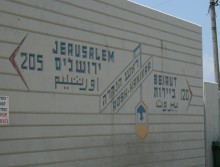
It’s closer than you think. Sign showing the distance between Jerusalem and Lebanese capital city. Illustrative. By Joshua Spurlock
Remember the Butterfly Effect—the idea that one action can have a far-reaching impact on many people in many places? Because that’s what’s happening right now in Syria. An international terrorist organization is currently fighting in Syria for the regime and it’s endangering the entire Middle East, according to a group of world leaders.
Foreign Ministers from 11 countries—including the US, Egypt, Jordan and several European nations—said in a press statement that the involvement of “foreign combatants” fighting for the Syrian authorities are a “serious threat to regional stability.” The scary thing is that it’s not just a threat: major violence is already breaking out in the region because of Syria.
The involvement in Syria of Hezbollah, a terror group from Lebanon, has already led to mini-civil war breaking out between two neighborhoods in Lebanon. Dozens have been killed in the Lebanese conflict and at least 200 have been wounded, according to The Daily Star newspaper.
One neighborhood backs Syrian President Bashar al-Assad, and one neighborhood supports the Syrian rebels. The Lebanese violence started after major fighting broke out in a Syrian town near Lebanon, in which Hezbollah is playing an important role. The Daily Star reported that the rebel supporters in Lebanon are refusing to stop their fire until Hezbollah leaves the Syrian town.
Why would attacking other Lebanese citizens and the Lebanese army possibly convince Hezbollah to withdraw its fighters from this Syrian town? Because Hezbollah is not only a terrorist organization—it’s the most powerful group in the Lebanese government too. Think of it as a Middle East mafia that runs the town.
So see if you can follow the current crisis:
1. Hezbollah runs the Lebanese government.
2. Hezbollah starts fighting for the Syrian regime.
3. Supporters of the Syrian rebels start a mini-civil war in Lebanon.
4. They refuse to cease fire unless Hezbollah stops fighting in a Syrian town.
It’s complicated, that’s for sure. Basically just know that the Syrian civil war is having unexpected consequences for the entire Middle East. That’s bad for you because oil markets prefer quiet and stability in the region—enough fighting could lead to higher gas prices.
That’s also scary for you because terrorists in Syria could use the chaos to acquire advanced missiles or even chemical weapons and ultimately put you and your country at risk.
Remember the Butterfly Effect?
(By Joshua Spurlock, www.themideastupdate.com, May 24, 2013)
